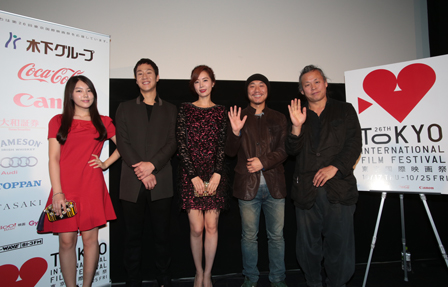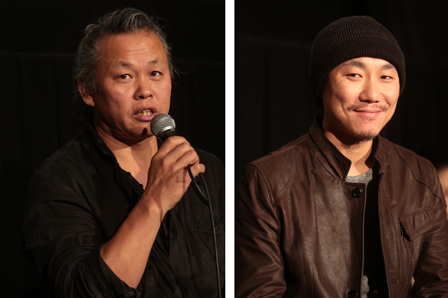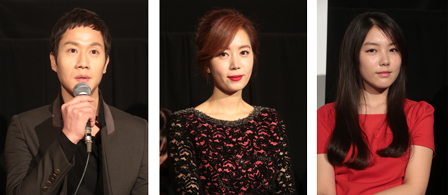
“Red Family” Press Conference
Lee Ju-hyoung (Director)
Kim Ki-duk (Executive Producers/Story/Editing)
Kim Yumi (Actress)
Jung Woo (Actor)
Park So-young (Actress)
Kim Ki-duk is the great conundrum of Korean cinema, a world-renowned director whose movies are not box office hits in his own country, and yet he’s an eccentric celebrity in South Korea who can find funding for anything he wants to make. However, his latest film, “Moebius,” was banned in his own country until he agreed to cut two minutes, so apparently he’s not bullet-proof. He didn’t direct “Red Family.” Newcomer Lee Ju-hyoung did. It’s his first feature. But it was obvious from the information related during the press conference that he was selected to direct it by Kim, who produced and wrote the screenplay.
The premise seems ripe for the sort of black humor that Kim is famous for. A quartet of North Korean spies pose as an average Seoul family to collect intelligence and assassinate defectors. The joke is a good one: though none of these people are related to one another, they act like the perfect family in public, and look like the picture of familial harmony compared to their neighbors, who are constantly bickering. “Capitalists!” hisses their leader when she observes the petty squabble constantly erupting next door. Seung-hae (Kim Yumi) is a strict disciplinarian who threatens the other three with scathing reports if they betray any of the decadent traits they see at large in South Korea. It’s easy to keep the three in line, since everyone has family back in the north, and those family members will pay for the mistakes of the spies. But over the course of the film, the various spies watch the family next door, and though they are always at each other’s throats, the interactions remind them that they are exiled from their own loved ones. Naturally, they start to act like a real family, not for show, but toward each other, in natural solidarity; meaning when one is threatened, usually by the handler who runs a small machine shop and gives them their assignments, they instinctively try to protect the unit, just as a family would. As a result, Seung-hae makes a fatal calculation that threatens not only their own lives, but those of their neighbors.

Kim admitted that the premise is purely imaginary. “Do such spies exist in South Korea?” he said in response to a question. “You’d have to ask our intelligence agency that question. My personal thinking is that there are spies in every country. Spies are good catalysts for films. They help us think about the world we live in.”
One of the main themes of the movie is how ideology shapes emotions. In the film’s most complex scene, the two families are celebrating a birthday and the TV news is on. The newscaster mentions a story from North Korea and the two groups get into an argument about the “humanity” of Kim Jong-un, with the spies, of course, defending the NK leader while the other family, unaware that they are arguing with actual North Koreans, ridiculing his style and youth. “People are born into certain ideologies,” said Lee, “because they are born into a community, a nation, or a family. The clash of ideologies is a great theme, and for all Koreans this issue is the line that separates our two nations, a line defined by ideology.”
In the context of the film, ideology clashes with the spies’ respective emotional responses to their neighbors. “They are faced with a dilemma,” Lee said. “In order to save their own families back in the north, they have to kill another family, but it isn’t easy. If you want to clear the air in your house, you open the window, but what if it’s cold outside? What do you do in that situation?”

Actress Kim Yumi described how difficult it was portraying such an ideologically strict character. “I realized my limits playing this part,” she said. “Sometimes I wanted to give up, but I’m glad I didn’t. This movie advocates dialogue between the North and the South, and I was worried how it might be perceived by Japanese audiences, and was gratified to see how receptive people were yesterday when it was premiered here at TIFF.”
One journalist was moved enough to remark on how she came away with the idea that mutual respect is the most important aspect of interpersonal relations, since the neighboring family, during their fights, are constantly harping on the notion that their family members don’t show enough respect toward one another. She asked Kim if he thought the two Koreas would ever reunify.
Kim himself was moved by the remark. “Yes, that’s exactly my purpose,” he said. “I’ve made other films about this issue, like ‘Poongsan’ [which makes a cameo in the film as a matinee screening that two of the North Koreans attend], and there are many movies in South Korea that deal with the same problem. They’re comedies, action films, some are even vehicles for idol stars. Actually, I wanted to approach it seriously.”








